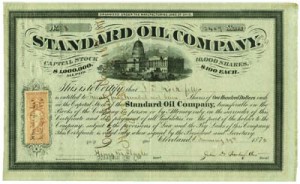On May 20, Spink will be hosting a Bonds and Share Certificates of the World Sale “full of some of the most interesting pieces to come on the market in recent years,” auctioneers said.
The sale contains two collections amassed over many years through “hard work and dedication to scripophily”: the Menzel Collection, and the second offering of the Peter Duppa-Miller Collection of Gold Mines of the World.
Lot 328 is an “extremely important” warrant signed by Lord Wellington while commanding British forces in Spain and Portugal. Wellington’s headquarters were at Alverca in Portugal, where he tried to consolidate his position against the advance of French forces. It was at this time the Lines of Torres Vedras were built completely in secret. The document, dated July 5, 1810 at Alverca, simply signed “Wellington”, is addressed to John Paramor Bays, Deputy Paymaster General, instructing him to receive £78,000 from Robert Hugh Kennedy, Commissary General, and to draw bills as and when necessary.
This “very important” document in superb condition is a “delightful piece for the avid collector,” added the auctioneers.
It’s estimated at £3,500-£3,800 ($6,520-$7,080 Cdn.).
VALUABLE SCRIPOPHILY
And from the Menzel Collection comes one of the most valuable examples of scripophily in history, said auctioneers.
Lot 873 is an 1870 Founders’ share certificate for $100 from the Standard Oil Co., issued by John D. Rockefeller and signed by him twice, once as president and the stock transfer, on the reverse. It’s also signed three times by H.M. Flagler, once as secretary, once on the revenue stamp and one time for cancellation.
The Standard Oil Co. Inc. was established in January 1870 by Rockefeller, who was its mastermind, founder, chairman and major shareholder. Standard Oil was without doubt one of the most powerful companies in history. Never before or after has one single company been able to create a worldwide market for oil products and control the whole production chain from the oil wells to the consumer. It dominated the oil product markets for many years through aggressive horizontal integration in the refining sector, then, in later years through vertical integration. It was also an innovator in the development of the business trust. It streamlined production and logistics, lowered costs, and undercut competitors.
Its controversial history as one of the world’s first and largest multinational corporations ended in 1911, when the U.S. Supreme Court ruled Standard Oil was an illegal monopoly and had to be dissolved into 34 “smaller” companies. Two of these companies eventually became Exxon and Mobil. With the dissolution of the Standard Oil, Rockefeller became the richest man in the world.
Founder shares of the Standard Oil are extremely rare. In the 1960s, the president of Exxon presented about two handfuls of theses Founders shares as a gift to his vice-presidents. These certificates are now all in collectors’ hands and have not been seen on the market for many years. What makes this certificate one of the most valuable pieces of scripophily in history is the fact it’s issued to Rockefeller himself and represents a capital of Mio.
This “truly historic certificate” is estimated at £30,000-£50,000 ($55,000-$93,000 Cdn.).


